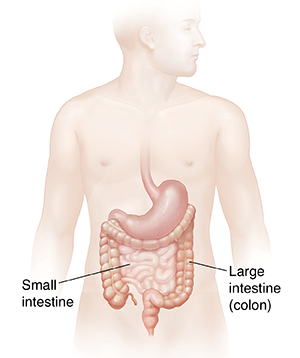The small and large intestines are long tubes in the belly that play a big part in digesting food. An intestinal obstruction means that the small or large intestine is blocked at one or more spots. This prevents air, food, stool, and fluid from passing normally through the digestive system. It's also called a bowel obstruction or blockage. A complete obstruction is a surgical emergency.
What causes intestinal obstruction?
Intestinal obstruction in newborns and infants can be caused by:
-
Telescoping of one segment of intestine into another (intussusception).
-
Twisting of the intestine (volvulus). The intestine can sometimes twist around itself. This can cause a blockage.
-
Swallowed objects.
In adults, intestinal obstruction can by caused by:
-
Scar tissue inside the belly. Scar tissue can form after surgery or after some intestinal infections. It can press on the intestine.
-
A hole or split in the belly wall (hernia). If you have a hernia, part of your intestine may slip through the belly wall and get pinched. Then food and fluid can’t flow through as usual.
-
Tumors. These can grow inside or outside the intestines. Tumors can block the intestines from the inside. Or they can press on them from the outside.
-
Crohn's disease, which is an inflammatory disease.
-
Impacted stool.
-
A parasitic worm infestation. Collection of parasitic worms may block other parts of the small intestine.
-
Postoperative ileus. This is a problem with the bowel after abdominal surgery. It may also occur after you have other types of surgery. Anesthesia and surgery temporarily slow down intestinal movement, and the bowel stops working as it should. An ileus after surgery often goes away on its own. But it may need to be treated if it lasts longer than expected.
-
Strangulation. If an obstruction cuts off the blood supply to the intestine, the condition is called strangulation. This can cause part of the strangulated intestine to die. The most common causes of strangulation are strangulated hernia, volvulus, and intussusception.
-
Diverticulitis. This is inflammation or infection of bulging pouches of intestines.
-
Stricture. This is a narrowing in the colon caused by scarring or inflammation.
-
Neurogenic bowel. It’s caused by a nerve problem in the lower part of the colon, leading to loss of normal bowel function.
Symptoms of intestinal obstruction
Symptoms of intestinal obstruction can vary. It depends on where the blockage is and if the intestine is partly or fully blocked. Symptoms may include:
-
Belly pain or cramping. This may be constant or come and go.
-
A feeling of fullness or bloating.
-
An upset stomach (nausea) or vomiting.
-
Diarrhea.
-
Constipation.
-
Loss of fluid (dehydration).
-
Inability to pass gas or stool.
-
Fever or sweating.
-
Discomfort and bloating after meals.
How is intestinal obstruction diagnosed?
During a physical exam, the doctor may find bloating, tenderness, or hernias in the abdomen.
Tests that show obstruction include:
-
An abdominal CT scan.
-
An abdominal X-ray.
-
A barium enema.
-
An upper GI and small bowel series.
-
An abdominal ultrasound.
Treatment for intestinal obstruction
The main goal of treatment is to relieve the blockage in your intestine. A complete obstruction is a surgical emergency.
Treatment depends on where the blockage is and if the intestine is partly or fully blocked. It also depends on what is causing the blockage. Most cases of small intestinal obstruction will go away after a few days. Treatment may include:
-
Removing the contents of the digestive tract above the blockage. This is done through a tube that's inserted through your nose and goes down into your stomach.
-
Giving fluids through an I.V. (intravenous) line placed in your arm or hand. This replaces fluids lost with vomiting or diarrhea. It may also be used to give you medicine if needed.
-
Using an endoscope (a flexible viewing tube), which is inserted through the anus, or using a barium enema, which inflates the large intestine. These treatments may be used for some disorders, such as a twisted segment in the lower part of the large intestine.
-
Cutting adhesions to release the trapped segment of the intestine. But adhesions may form again and cause another obstruction.
-
Having surgery. For a serious intestinal obstruction, surgery is often needed to remove the blockage and fix any damage. In some cases, an ileostomy is done. This is a surgery in which a cut-off end of the small intestine is attached to a surgical opening in the abdominal wall. Or a colostomy may be done. This surgery creates an opening between the large intestine and the abdominal wall.
-
Placing a tube (stent) to keep an area of the large intestine (colon) open if a tumor is blocking it. This can be done during a colonoscopy.
Possible complications of intestinal obstruction
Intestinal obstructions can have serious complications, such as:
-
Blockage of blood flow to the intestine. This can cause intestinal tissue to die.
-
Leakage of intestine contents into the belly.
-
Irritation or infection in the belly cavity.
-
Death.
When to call your doctor
Contact your doctor right away if you have:
-
A new lump or bulge in the skin on your belly or groin.
-
Vomiting that won’t stop.
-
An inability to pass gas or stool.
-
A swollen belly or increasing belly pain.
-
Weakness, dizziness, or fainting.
-
Abnormal drowsiness or confusion.
-
Reduced urine output or extreme thirst.
-
A fever of 100.4°F (38°C) or higher, or as directed by your doctor.
-
Chills.
-
Pain that gets worse.
-
Symptoms that don’t get better with treatment or that get worse.
-
New symptoms.
Author: Freed, Becca
© 2000-2025 The StayWell Company, LLC. All rights reserved. This information is not intended as a substitute for professional medical care. Always follow your healthcare professional's instructions.

